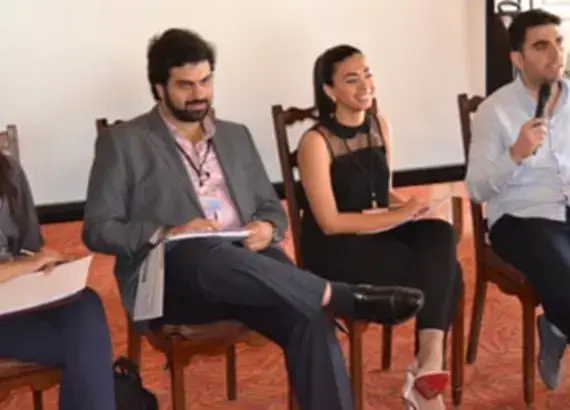
Success Story
Campaign School Graduates Help Lebanese Youth Consider Outreach Strategies
Despite the possibility of spillover violence from Syria, a vacancy in the presidency and postponed parliamentary elections, young Lebanese party activists are eager to find ways to enter politics.
Forty of them, representing five political parties, gathered outside Beirut last month for a campaign school for future candidates and campaign teams to learn how to build outreach strategies and create messages that address voter interests.
The young attendees, ages 18 to 25, brought together by NDI, came from the Free Patriotic Movement, Future Movement, Kataeb, Lebanese Forces and Progressive Socialist Party.
The Lebanon campaign school is part of a regional program launched in 2012 and supported by the U.S. State Department’s Middle East Partnership Initiative (MEPI). To date, 244 political activists from 12 countries have graduated from the regional schools. Fifty of them have also taken part in Training-of-Trainers (TOT) programs that provide the skills needed to deliver similar sessions for their own parties in their home countries.
 Drawing on an 11-module curriculum and agenda, NDI’s Lebanon staff, along with campaign school graduates from Jordan and Tunisia, presented best practices in collecting and using data on voters and supporters, message development, public speaking, campaign strategy and action planning. By stepping out of their daily political environment, participants were able to focus on skill-building, rather than their party’s positions, and build new relationships across party lines.
Drawing on an 11-module curriculum and agenda, NDI’s Lebanon staff, along with campaign school graduates from Jordan and Tunisia, presented best practices in collecting and using data on voters and supporters, message development, public speaking, campaign strategy and action planning. By stepping out of their daily political environment, participants were able to focus on skill-building, rather than their party’s positions, and build new relationships across party lines.
“Through the campaign school, I learned how to develop a strategy and plan effectively, which I will incorporate in my party’s plan for municipal council elections scheduled for next year,” said a campaign school graduate from the Free Patriotic Movement, who is currently serving as vice-president of a municipality. He and other graduates attended the campaign school to share how the experience shaped their current political work.
In an election simulation, participants were divided into fictitious parties that competed in mock parliamentary elections. The mock parties chose campaign roles for each member, set vote goals, developed and carried out voter targeting plans and worked through the night to prepare a campaign plan that was presented to the larger group.
“As a member of my party’s youth organization, I focus on our strategy for university elections. The simulation was the best way for me to learn about skills. When we applied them, we saw the impact,” said a campaign school graduate from the Progressive Socialist Party during his remarks at the opening panel session for the school.
 On the simulated election day, candidates took part in a debate, where they squared off on issues such as education, employment, how to engage youth and build trust with potential voters. Polls then opened and participants voted for their preferred party and candidate, under the watchful eye of party observers.
On the simulated election day, candidates took part in a debate, where they squared off on issues such as education, employment, how to engage youth and build trust with potential voters. Polls then opened and participants voted for their preferred party and candidate, under the watchful eye of party observers.
For the closing ceremony, NDI invited current youth wing leaders from each of the five parties to encourage the aspiring politicians and witness the election results announcement. Also, NDI trainers shared feedback with groups on how to improve their campaigns.
“I’m a different person. I’ve improved my skills to maximize resources and work as a member of a team. As a result, I am now responsible for women’s engagement in my party. I also benefited from learning about different cultures and working together to present a strong campaign plan,” said a graduate who was recently appointed as head of Kataeb’s women’s wing.
With student elections approaching in the fall, and municipal council elections constitutionally mandated in May of 2016, young Lebanese party activists have an opportunity to use their drive and creativity to contribute to effective campaigns and recommit to democracy in Lebanon, in the midst of pressing national and regional challenges. NDI will continue to work with Lebanese political parties throughout the summer as they prepare for their own youth camps to motivate their young activists for the year ahead.
Read more:
Published on May 8, 2015



